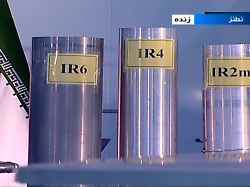Tehran’s nuclear policy
Iran is pursuing these goals with uranium enrichment
By Delara Nutz and Andrea Sellmann
12/08/2022, 6:28 p.m
Iran enriches uranium with a purity of 60 percent. 80 percent are needed to build an atomic bomb. Internally, the regime sells its nuclear policy as a sign of self-determination. On the outside, it creates a threatening backdrop to the west. A strategy that could soon fail.
The mullahs are taking a hard line: the regime says the internal affairs of the Islamic Republic of Iran have nothing to do with the West. No other country is allowed to interfere. This statement refers to the current protest movement and the expansion of nuclear technology in the country.
Does Iran really only use nuclear power for peaceful purposes? Or does the regime want to build an atomic bomb under civilian cover? For Islamic scholar Guido Steinberg, the answer is clear: Iran is just on the verge of arming itself with nuclear weapons, he said ntv podcast “Economy World & Far”. He expects Iran to make a public statement to that effect in the coming months. Only a military threat – from Israel or the US, for example – can stop the regime from doing so.
“Knows exactly what fears are fueled”
Political scientist Ali Fathollah-Nejad explains what he believes is the goal behind it: Tehran is using the nuclear program strategically “because it knows exactly what fears are being fueled in the West,” says the native Iranian. In his view, the regime wants to become immune to foreign attacks – just as North Korea, which has nuclear weapons, has been doing for years.
However, the Iranian government is paying a high price for its nuclear policy. The United States withdrew from the international nuclear deal in 2018 and tightened sanctions against Iran. This had a significant impact on the local economy. German-Iranian business contacts are also affected: Machines “made in Germany”, once an export hit in Iran, are hardly ever sold anymore. A factor that is difficult to compensate for in the long run with Russian or Chinese imports.
Since Iran was excluded from the SWIFT payment system, German-Iranian foreign trade has also plummeted. Within a year, it has almost halved from over 3 billion euros to around 1.7 billion euros. According to the German-Iranian Chamber of Industry and Commerce, the bilateral trade volume in the first seven months of this year was 1.072 billion euros. Steinberg explains that companies could use Turkey to circumvent the sanctions. Smaller transactions would even be processed again using suitcases of money. But all of this is happening in an area that “hardly plays a role anymore in economic terms.”
Right to nuclear technology?
The regime is propagating that there is a right to nuclear technology, which is essential for the country’s industrialization, explains Fathollah-Nejad. It’s about spreading national pride in order to secure popular approval. However, the sanctions are severely weakening the Iranian economy. According to the political scientist, the regime’s attempt to sell Iran’s nuclear program as “a sign of self-determination” is being met with increasing rejection.
The current situation in the country is confusing: Guido Steinberg believes that the regime’s power base is largely intact despite the poor economic development and sees “several hundred thousand men who are ready to kill, arrest and torture en masse for this regime.” Ali Fathollah-Nejad nevertheless firmly believes in a revolutionary process. Even if the protests are currently unsuccessful, for him “the next explosion of anger is only a matter of time.” And one thing is clear to the Islamic scholar: “There is definitely potential for change. If not in the short term, then in the medium term.”
What does Germany have to do in order to still play an important role in the economic world of tomorrow? Who are we dependent on? Which countries benefit from the new world situation? Mary Abdelaziz-Ditzow discusses this in the ntv podcast “Wirtschaft Welt & Weit” with relevant experts.
You can find all episodes in the ntv app or wherever there are podcasts: at RTL+ music, Apple Podcasts, Google Podcasts, Spotify, Amazon Music or deezer. For all other podcast apps, you can use the RSS feed.
